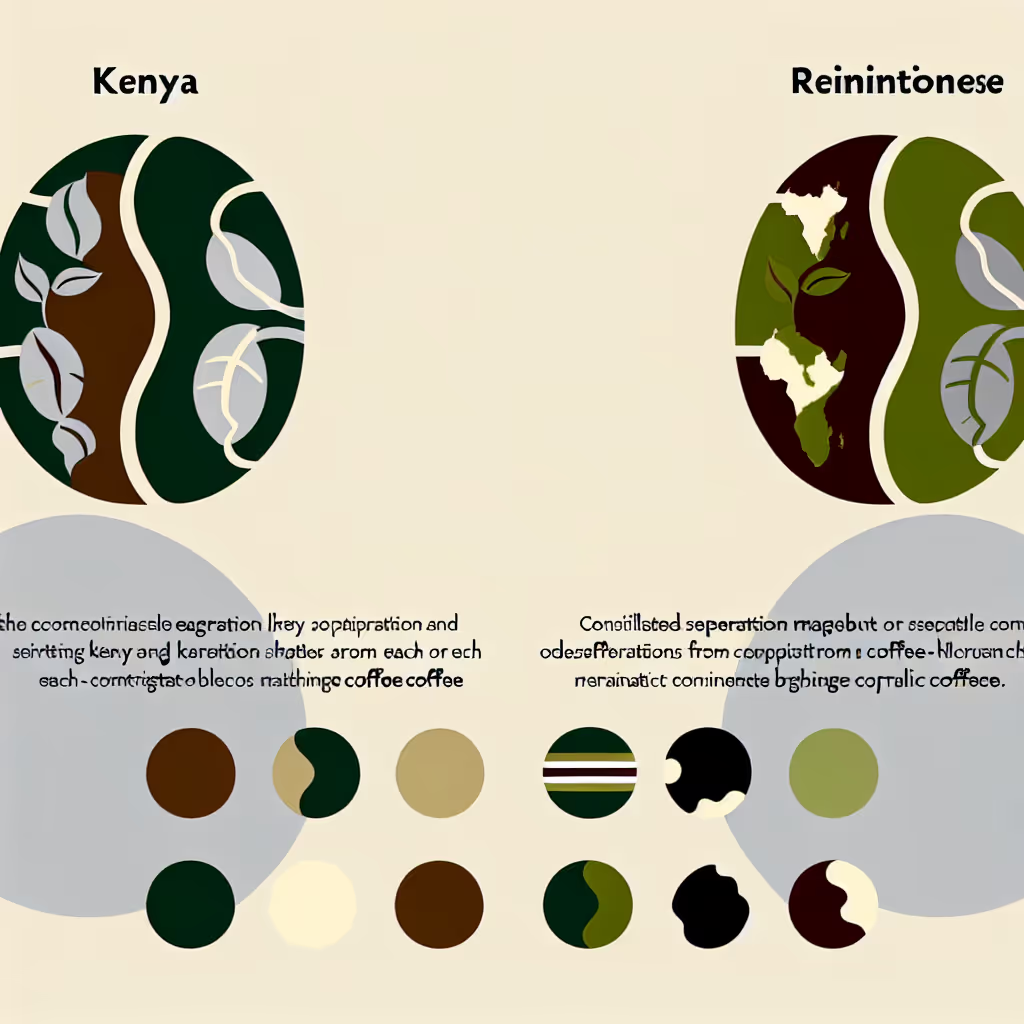Kenyan Vs. Jamaican Blue Mountain Coffee
This comparison explores the distinct qualities of Kenyan and Jamaican Blue Mountain coffee, examining their flavor profiles, growing conditions, and cultural significance to help coffee enthusiasts make informed choices.

Brief Description
Kenyan coffee is renowned for its bright acidity, full body, and complex flavor profile. Grown in the rich volcanic soils of the Central Highlands, these beans benefit from ideal climate conditions and meticulous processing. The result is a cup that's bold, wine-like, and often described as the 'connoisseur's choice'. With notes ranging from blackcurrant to citrus, Kenyan coffee offers a truly unique and memorable tasting experience.
Jamaican Blue Mountain coffee is renowned for its exceptional quality and smooth, mild flavor profile. Grown in the misty peaks of Jamaica's Blue Mountains, these beans benefit from ideal climate conditions and rich volcanic soil. The strictly regulated cultivation and processing methods result in a coffee that's prized for its clean taste, lack of bitterness, and subtle, complex flavors. This rare and sought-after coffee commands premium prices in the global market.
Importance of Comparison
Comparing Kenyan and Jamaican Blue Mountain coffee is crucial for coffee lovers seeking to understand the nuances of premium single-origin coffees. These two origins represent some of the most sought-after beans in the world, each offering unique flavor profiles and characteristics. By exploring their differences, consumers can better appreciate the diversity of coffee flavors and make more informed purchasing decisions.
Key Attributes
Origin
Kenyan
Jamaican


Consumer Guide
When choosing between Kenyan and Jamaican Blue Mountain coffee, consider your flavor preferences. Kenyan coffee offers a bright, bold taste with wine-like acidity and complex flavors of blackcurrant and citrus. It's ideal for those who enjoy a more intense, vibrant cup. Jamaican Blue Mountain, on the other hand, provides a smooth, mild flavor with subtle nutty and floral notes, perfect for those who prefer a gentler, less acidic coffee. Consider brewing methods as well; both origins excel in pour-over and French press, but Kenyan's boldness may stand up better in cold brew. Price is also a factor, with Jamaican Blue Mountain typically commanding a higher premium due to its rarity and strict quality controls.
Expert Opinions
Coffee expert James Hoffmann notes, 'Kenyan coffee often displays a juicy, wine-like acidity that's unparalleled in the coffee world.' Regarding Jamaican Blue Mountain, specialty roaster Anne Cooper states, 'Its smooth, clean taste and lack of bitterness make it a true luxury coffee experience.' Both experts agree that these origins represent the pinnacle of their respective flavor profiles, with Kenyan offering complexity and Jamaican Blue Mountain providing refined subtlety.
FAQs
Kenyan coffee is known for its bright acidity, full body, and complex flavors of blackcurrant and citrus. Jamaican Blue Mountain coffee offers a smooth, mild taste with subtle nutty and floral notes, and is prized for its lack of bitterness.
Kenyan coffee is grown in the Central Highlands at altitudes of 1400-2100m, while Jamaican Blue Mountain coffee is cultivated at 900-1700m. Both benefit from volcanic soil, but Kenya's higher altitude contributes to its more intense flavor profile.
Kenya produces significantly more coffee, with an annual production of about 50,000 metric tons. In contrast, Jamaican Blue Mountain coffee is much rarer, with only around 700 metric tons produced annually, contributing to its higher price.
Both origins excel with pour-over and French press methods. Kenyan coffee's bold flavor also makes it suitable for cold brew. The smooth, subtle flavors of Jamaican Blue Mountain are particularly well-suited to pour-over brewing to highlight its delicate notes.
Kenyan coffee typically undergoes washed processing with double fermentation and sun-drying. Jamaican Blue Mountain coffee uses washed, natural, and pulped natural processing methods. These differences contribute to the unique flavor profiles of each origin.
Jamaican Blue Mountain coffee is generally more expensive due to its rarity, strict quality controls, and global reputation. The limited production area and rigorous certification process contribute to its premium price, while Kenyan coffee, though also high-quality, is more widely available.
Conclusion
Both Kenyan and Jamaican Blue Mountain coffees offer exceptional quality and unique tasting experiences. Kenyan coffee stands out for its bright acidity, full body, and complex flavors, making it ideal for those who enjoy a bold, vibrant cup. Jamaican Blue Mountain, with its smooth, mild profile and subtle complexity, appeals to those seeking a refined, luxurious coffee experience. While Kenyan coffee offers excellent value and is more widely available, Jamaican Blue Mountain's rarity and prestige make it a special treat for discerning coffee lovers. Ultimately, the choice between these two remarkable origins comes down to personal taste preferences and budget considerations.






